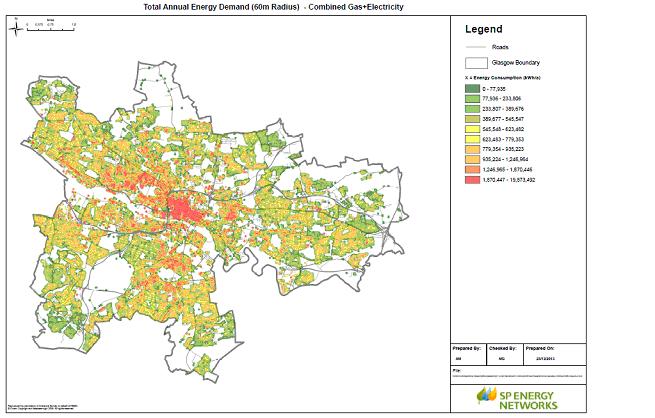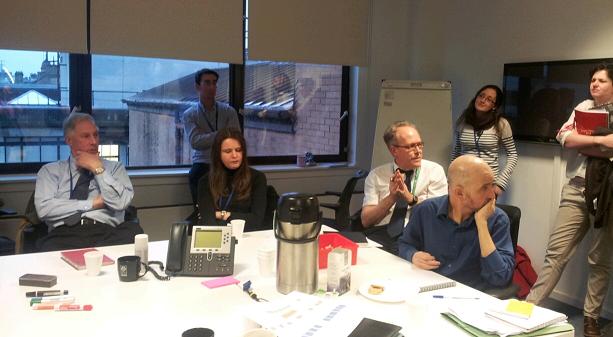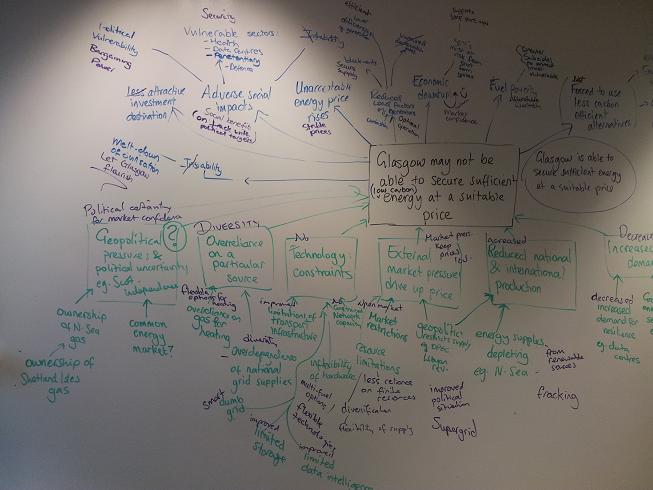Glasgow’s Energy and Carbon Master Plan 2014-2020
Glasgow City Council published the Sustainable Glasgow report in 2010 outlining its vision and actions for a low carbon future and setting a target of 30% for the reduction of CO2 emissions by 2020 across the city. The report was Glasgow’s Sustainable Energy Action Plan (SEAP) which was submitted to the EU Covenant of Mayors and set out more than 30 actions for energy demand reduction, efficiency and renewable energy covering buildings; transport; local electricity production; local district heating; land use planning and working with citizens and stakeholders.
The STEP UP project team at Glasgow City Council began working on producing an enhanced SEAP which called ‘Glasgow’s Energy and Carbon Masterplan 2014 – 2020’. A gap and issue analysis of the existing SEAP highlighted areas where improvements could be made. This was supplemented by an analysis of the city’s energy system and flows carried out by Scottish Power Energy Networks (SPEN). SPEN as the distribution network operator (DNO) has completed an analysis of the city’s energy consumption systems and future demand and has produced ‘heat maps’ showing existing and forecast demand for lighting, heat and hot water across the city. SPEN modelled the energy consumption of Glasgow’s building stock using tools that predict the electricity and gas consumption data of each building in the city. The modelling process used a building’s location, size (gross internal floor area or number of habitable rooms), use class and age. This data was used in conjunction with energy consumption benchmarks for each building type, and presented via a Geographic Information System (GIS) to map the distribution of energy consumption density across the city.

Modelling future energy flows and demand took into consideration changes to the city’s building stock over the desired forecasting period. This was achieved using Council spatial development plans, combined with construction planning data, allowing changes to the city building stock to be incorporated. Development plans identified areas of potential change, including:
• Residential regeneration of brown field land
• Urban renewal of current residential areas
• Greenfield release for new residential development
Specific planning applications identified specific developments including:
• Major housing developments
• Waste to energy plants
• Large office developments, and
• Major retail sites
The maps are featured in the enhanced SEAP (Energy and Carbon Masterplan) to help identify suitable areas for implementing district heating schemes and other energy projects across the city. The introduction of more district heating in Glasgow will be one of the most effective measures for reducing Glasgow’s CO2 emissions from heating in buildings, especially where electrical heating is involved.
The Glasgow STEP UP team has conducted a series of workshops to analyse challenges faced by the city. The workshops employed the 'Problem/Solution Tree Analysis' methodology. Various representatives from key stakeholders in the city- participated and analysed topics on; transport, finance, CO2 reduction, energy supply security and regeneration.

Problem/Solution Tree analyses was useful way of establishing the root cause of problems addressed in SEAPs and generating solutions.

Problem/Solution Tree Analysis
Further stakeholder engagment was undertaken in the form of a stakeholder survey inviting over 200 groups in the city to give their views on the vision,priorities and targets with respect to energy.This was particularly focused on engaging more with residents in the city.
For more detail on the response to the survey, please see the link below.
 You can view a summary of the stakeholder survey results here.
You can view a summary of the stakeholder survey results here.
Whilst the first SEAP was a highly ambitious and comprehensive report, the enhanced Energy and Carbon Masterplan takes greater account of the views of stakeholders and also engages with citizens. .
After assimilating these results and outcomes carried out through the various stakeholder engagement exercises and policy and city analysis as a result of the STEP UP project deliverables, Glasgow City Council have now delivered the new Energy and Carbon Masterplan , which got final approval in March 2015. The plan and its 33 enhanced actions are now being taken forward by the newly formed City Energy Team, who will ensure Glasgow hits its 30% reduction target by 2020.
To view the full copy of Glasgow's Energy and Carbon Masterplan, please click here
To view an Executive Summary of Glasgow's Energy and Carbon Masterplan, please click here